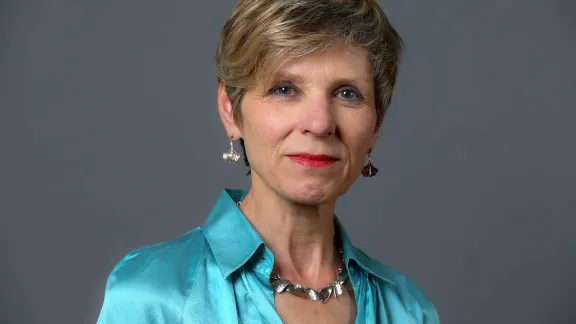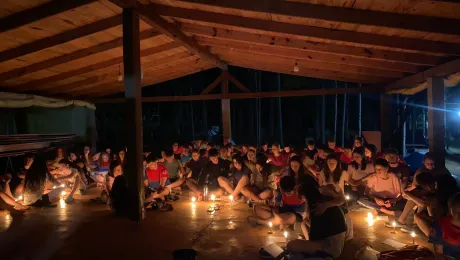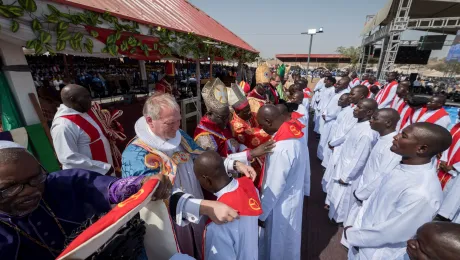
Rev. Ruth Wolff-Bonsirven of the Union of Protestant Churches of Alsace-Lorraine. Photo: UEPAL
Voices from the Communion: Rev. Ruth Wolff-Bonsirven of the Union of Protestant Churches of Alsace-Lorraine
Ruth Wolff-Bonsirven was growing up in France’s north-eastern region of Alsace-Lorraine on the border with Germany, all children were obliged to speak French in school. But she recalls that, as a 6-year-old in her first class, she felt ashamed and was unable to talk to anyone because she only spoke the local German dialect that her family used at home.
That traumatic childhood experience of being “unable to speak” led her on a journey to ordination, as she increasingly found words in Scripture that could help her speak out for herself and for other “silenced” women in the church.
Today, Wolff-Bonsirven is one of seven leaders of the Lutheran church in her region and a former Council member of France’s Federation of Protestant Churches (FPF).
You were the second woman ordained as a pastor in the Union of Protestant Churches of Alsace-Lorraine (UEPAL), weren’t you?
Yes, I was ordained in 1998 and there was one other woman pastor before me, but she was not allowed to marry. I was the first who didn’t have to choose between the ministry or marriage and family life.
Tell us about the church in that region?
Protestants number between two or three percent of the population overall in France but in Alsace-Lorraine they make up about a tenth of the population. Numbers of Catholics are dropping and Mass attendance is down to about ten percent, while our numbers seem to be staying constant.
The history of Protestantism in our region goes back to John Calvin who founded the first Reformed church in Strasbourg. During the last century, the city was in the forefront of the ecumenical movement with the Centre for Ecumenical Studies set up in 1965. In 2006 the Lutheran and Reformed churches joined to form UEPAL with an Assembly and a governing Council of 16 members.
You are one of the leaders of the church there?
Yes, I was appointed as an ‘inspectrice ecclésiastique’ in 2011 and my mandate was renewed by a vote of confidence three years ago. I was named as an ‘inspecteur’ but I crossed it out and wrote ‘inspectrice’ on my letterhead because I think inclusive language is very important and women need to feel they are represented.
During my 12 years on the Council of the FPF I kept trying to insist on this in all our notices and advertisements because it is symbolic and it represents how we see the world. To begin with, my efforts were unpopular and ignored, but eventually the president sent around a letter to everyone saying that “as society has changed, so can the church!”
You have spearheaded other initiatives to promote greater visibility of women in the church too – where does your passion for this work originate from?
I have always felt drawn to the feminist cause because I wanted to make my voice heard. Talking about my childhood with other people has helped me to understand that it stems from my resistance to the trauma of being silenced, as a little schoolgirl because I was forbidden to speak my own language. It has compelled me to speak out for so many other women who are silenced by their churches, their families or their communities.
Many years ago, I gathered groups of pastors to discuss the difficulties that women encounter, and we realized what huge challenges we were facing. I have also led discussions on feminist theology with women from other churches and other faith groups too, because all female leaders are minorities within their own contexts.
In my church the practice has changed now to allow women the same rights, but the legislation still does not fully reflect that. I was asked to report to our Synod about these issues of equality and for the first time in 2018 we passed a resolution on implementing the Lutheran World Federation’s Gender Justice Policy.
What does it mean for your church and for your work to be a part of the global communion of churches?
I see this as my vocation, and I am grateful for the LWF’s work in highlighting the theology and Scripture behind our efforts for greater gender justice. I will keep on using my ministry of the Word to help other women make their voices heard too.
LWF/P. Hitchen
The Lutheran World Federation is a global body that shares the work and love of Christ in the world. In this series, we profile church leaders and staff as they discuss topical issues and set out ideas for building peace and justice in the world, ensuring the churches and communion grow in witness and strength.


